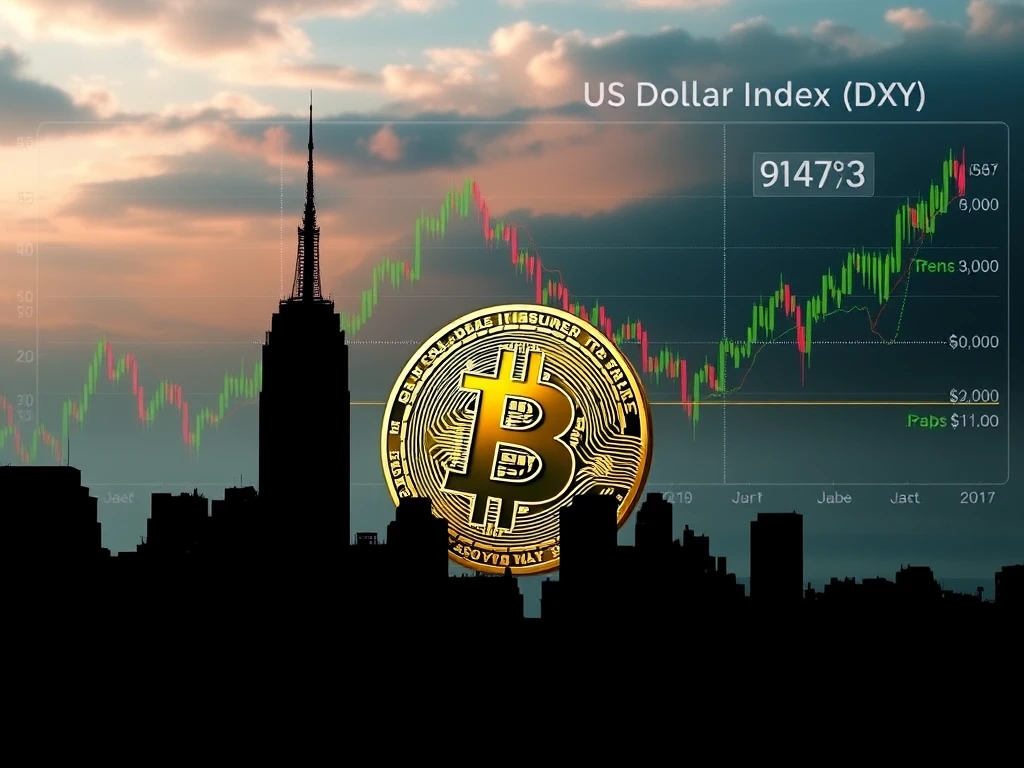Seize the Bitcoin Dip? 10-Year Treasury Yield Plunge Sparks Crypto Buying Frenzy

Is the recent dip in the 10-year Treasury yield and the softening of the Dollar Index (DXY) signaling a **golden buying opportunity** for Bitcoin? As traditional markets react to global economic shifts and trade tensions, could this be the moment crypto investors have been waiting for? Let’s dive deep into the market analysis to understand the potential implications for Bitcoin and whether this dip is indeed a **chance to buy Bitcoin** before a potential surge.
10-Year Treasury Yield Plummets: A Sign of Economic Shift?
On April 3rd, a notable event occurred in traditional finance: yields on long-term US government debt tumbled to their lowest levels in six months. This wasn’t just a minor fluctuation; it was a significant reaction from investors grappling with growing anxieties over the escalating global trade war and the weakening of the US dollar. The yield on the benchmark **10-year Treasury yield** briefly touched 4.0%, a considerable drop from 4.4% just a week prior. This sharp decline indicates a surge in demand for these bonds, often seen as safe-haven assets during times of economic uncertainty.
Key Takeaways:
- The 10-year Treasury yield fell to 4.0%, a six-month low.
- This drop reflects investor concern about the global trade war.
- It also signals a weakening US dollar and increased demand for safer assets.
| Metric | Value (April 3rd) | Previous Week |
|---|---|---|
| 10-Year Treasury Yield | 4.0% | 4.4% |
While a looming **economic recession** might initially seem like bad news for Bitcoin, historically, periods of economic downturn and reduced returns from traditional fixed-income investments can actually pivot investor interest towards alternative assets like cryptocurrencies. As bond yields decrease, the allure of assets offering potentially higher returns, such as Bitcoin, grows stronger.
DXY Softens: Dollar Weakness Fuels Bitcoin’s Appeal
Concurrently with the Treasury yield drop, the Dollar Index (DXY), which measures the dollar’s strength against a basket of six major currencies, also experienced a significant dip. On April 3rd, the **DXY** fell to 102, marking its lowest point in six months. A weakening dollar can be a powerful catalyst for alternative assets, including Bitcoin.
Why is this the case? A weaker dollar can erode global confidence in the US currency, prompting nations and investors to explore alternative stores of value. This shift in sentiment can directly benefit assets like gold and, increasingly, Bitcoin. Gold has already witnessed a surge, reaching a $21 trillion market capitalization and hitting all-time highs. Bitcoin, positioned as digital gold, could similarly capitalize on this trend.
Factors Contributing to DXY Softening:
- Growing concerns over US economic policies.
- Anticipation of potential shifts in global currency reserves.
- Trade war impacts and retaliatory measures from other nations.
Trade Wars and Inflation: A Perfect Storm for Bitcoin?
The ongoing trade war, particularly the newly announced US import tariffs, introduces a complex dynamic into the market. Axel Merk, a seasoned investment strategist, describes tariffs as creating a “supply shock.” This means that by increasing the cost of imported goods, tariffs reduce the availability of these goods relative to demand, potentially leading to inflationary pressures.
In an environment where inflation is rising and interest rates are potentially declining (as indicated by falling Treasury yields), traditional fixed-income investments become less attractive. Their real returns are eroded by inflation, pushing investors to seek assets that can better preserve or even increase their purchasing power. This is where Bitcoin’s narrative as a potential inflation hedge comes into play.
Even if one remains skeptical about Bitcoin as a direct inflation hedge, the diminished appeal of bonds in an inflationary environment is undeniable. Consider this: the global bond market is estimated at a staggering $140 trillion. If just a fraction, say 5%, of this capital begins to seek higher returns outside of traditional bonds, it could result in a massive $7 trillion influx into alternative asset classes, including stocks, commodities, real estate, gold, and, crucially, Bitcoin.
Is it Time to Buy the Bitcoin Price Dip?
So, with the **10-year Treasury yield** falling, the **DXY** softening, and trade war-induced inflation looming, is it indeed time to **buy Bitcoin price dip**? While timing the market bottom is notoriously difficult, several factors suggest a compelling case for considering Bitcoin at these levels:
Arguments for Buying Bitcoin Now:
- Reduced Appeal of Fixed Income: Lower bond yields and potential inflation make bonds less attractive.
- Dollar Weakness: A softening DXY favors alternative assets like Bitcoin.
- Safe Haven Narrative: Economic uncertainty and trade wars boost Bitcoin’s safe-haven appeal.
- Resilient Support: Bitcoin’s $82,000 support level held firm despite global economic jitters, indicating underlying strength.
Furthermore, the fact that Bitcoin’s price has shown resilience, holding above the $82,000 support level even amidst worsening global economic uncertainty, is an encouraging sign. This suggests a degree of inherent strength and investor confidence in Bitcoin’s long-term prospects.
Navigating Market Uncertainty with Bitcoin
The current market landscape is characterized by uncertainty. Trade wars, fluctuating currency values, and shifting economic policies create a volatile environment. In such times, diversification and exploring alternative investment avenues become paramount. Bitcoin, with its unique characteristics as a decentralized, scarce, and increasingly recognized digital asset, presents itself as a compelling option within this context.
While risks always exist in the cryptocurrency market, the confluence of factors currently at play – falling Treasury yields, a weakening dollar, and inflationary pressures – paints a potentially bullish picture for Bitcoin. For investors seeking to navigate these uncertain times and potentially capitalize on market shifts, exploring a strategic allocation to Bitcoin during this **Bitcoin price dip** might be a prudent move.
Disclaimer: This analysis is for informational purposes only and should not be considered financial advice. Investing in cryptocurrencies involves risks, and you should conduct your own research and consult with a financial advisor before making any investment decisions.









